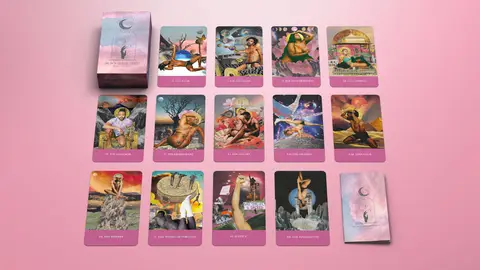This Beautiful Black Queer Tarot Deck Is the Future of Divination

From the very first time he had his cards read, Kendrick Daye was captivated by the tarot deck, a centuries-old spiritual tool for divination that doubles as a set of intricately illustrated playing cards. The Miami-born, Harlem-based multimedia artist and designer remembers seeking out a deck of his own a few years ago only to be disappointed by what he found.
Daye wanted cards with visuals that represented the diversity and vibrancy of his Black queer community. But the pickings were slim. "If the cards were queer-themed, they were mostly white," he tells NewNowNext, "or if they were Black-themed, they were not queer at all."
A self-starter and proud "triple Cardinal sign," Daye took it upon himself to design a new set of tarot cards centering Black LGBTQ people. The end product? The Black Queer Tarot, a new deck in the traditional 78-card tarot arcana that "[imagines] worlds where Black queer people are not just living; we're thriving." Each card is a work of art in its own right, framing evocative portraits of Black queer models in colorful, imaginative analog collages.
The Black Queer Tarot was a true labor of love for Daye, who didn't get serious about the endeavor until last fall. "I was originally going to use older works," he explains, "but later, I was like, if I'm going to do this, I'm going to make a deck with all new cards. And then that's where photographing all the muses came into play because I needed photos to work from."
Daye put out a call for Black queer models on Instagram, and the pieces began to fall into place with an ease that was...well, almost magical. He received an "overwhelming response" from his muses and conducted photoshoots throughout the fall and winter. On set, Daye was delighted to find that he could easy pair a model's vibe or energy with a corresponding element, motif, or card in the tarot arcana. He'd ask for each model's Sun, Moon, and Rising signs as a starting point, but more often than not, he let his intuition guide him.
At one point, his friend and tarot expert Justin Henry of Tarot Supreme joined the project as a spiritual consultant. "They came onboard and started applying meaning to these cards," Daye explains. "If you are into art, if you are into queer art, if you are into visually pleasing things, you'll enjoy [the deck]. But I also wanted to make sure that this was a tool that can actually be used, so Justin was able to ground these cards."
The cards of the deck will be familiar to seasoned tarot readers, but Daye kept beginners in mind throughout the design process, too. He collaborated with Henry on a companion guidebook to reading the cards, which is available for preorder now with the Black Queer Tarot via an Indiegogo campaign. The 78-card deck costs $50, and buyers can nab the guidebook for an additional $50.
Daye launched the fundraiser at the top of March; at the time of writing, he has already raised more than 70% of his $25,000 fundraising goal through preorders and donations. Everyone who has already preordered a deck will receive one, but if the campaign meets or exceeds the goal, Daye will be able to make and sell more decks moving forward. And given tarot's recent resurgence in popularity (TikTok tarot readings, anyone?), the demand will likely be there.
"Astrology, tarot — now, these things are all becoming mainstream, and I find that interesting because for so long they've been on the fringe," Daye says. "I think queer people have also been on the fringe, and the things we gravitate toward are similar in that we see this experience of being othered or on the outskirts of society, so they become attractive to us."
Spiritual tools like tarot also require "a vivid imagination," something that LGBTQ people understand on a deeper level. "There aren't that many examples for us," Daye says, "so we've had to imagine what a world looks like for us all the time." This is especially true for Black LGBTQ people, who are underrepresented in mainstream media compared to white LGBTQ folks. According to a recent report from GLAAD, just 23 of the 101 total LGBTQ characters on broadcast television shows in 2020 were Black.
"We just got the mock-ups now," Daye adds, shuffling through a prototype deck. "Just seeing at least this part of it, it feels really, really good. I'm really proud."





